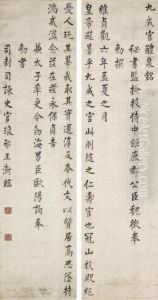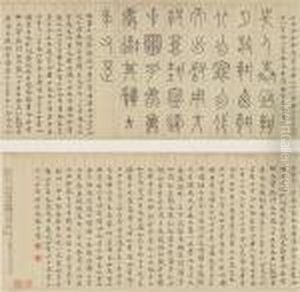Wang Shu Paintings
Wang Shu is a contemporary Chinese architect known for his commitment to traditional Chinese architectural principles and materials, as well as his innovative approach to modern construction. He was born on November 4, 1963, in Urumqi, the capital of Xinjiang in the People’s Republic of China. Wang Shu spent his childhood in the Xinjiang region and later moved to the Zhejiang Province in eastern China.
After completing his secondary education, Wang Shu attended the Nanjing Institute of Technology, School of Architecture, where he earned his bachelor's degree in architecture in 1985. He continued his studies at the same institution, receiving a master's degree in 1988. Instead of going abroad to further his studies or career, as many of his contemporaries did, Wang chose to travel across China, researching traditional building techniques and craftwork for several years. This period of hands-on, practical research deeply influenced his architectural philosophy.
In 1997, Wang Shu and his wife, Lu Wenyu, founded the Amateur Architecture Studio in Hangzhou. The name of the studio reflects Wang's view that architecture should be approached with the spontaneity and experimental spirit of an amateur. The studio is responsible for the design of a number of significant buildings and projects in China, including the Ningbo Museum of Art, the Xiangshan Campus of the China Academy of Art in Hangzhou, and the Vertical Courtyard Apartments in Hangzhou. These projects are characterized by their use of reclaimed materials, such as tiles and bricks from demolished traditional buildings, and their thoughtful integration with the surrounding environment and cultural context.
Wang Shu's work has garnered international attention and acclaim. In 2012, he was awarded the Pritzker Architecture Prize, the most prestigious award in the field, becoming the first Chinese citizen to win the prize. The Pritzker jury praised him for producing an architecture that is 'timeless, deeply rooted in its context and yet universal.' Wang Shu has also been a visiting professor at several universities around the world, including Harvard University and the University of California, Berkeley.
Beyond his architectural practice, Wang Shu has contributed to the theoretical discourse on architecture through writings, lectures, and exhibitions, advocating for an architecture that is sustainable and deeply connected to its cultural and historical context. He continues to work and reside in China, where he also served as the head of the School of Architecture at the China Academy of Art in Hangzhou.




